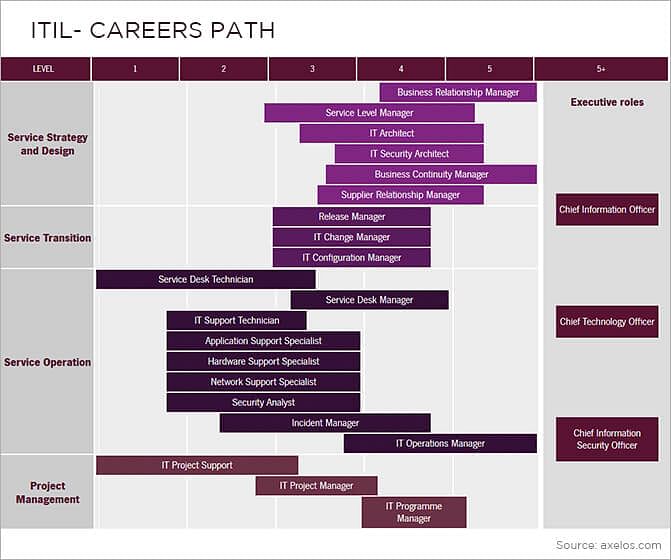While a hike in salary remains one of the primary reasons in seeking a professional certification, candidates find themselves being unsure about treading the path to gaining a certification, as career growth is not fully apparent at the beginning. When considering a professional certification, foresight is essential as it is advisable that professionals plan ahead on desirable outcomes in one’s career.
Preparing for ITIL? Take this test to know where you stand!
We have already discussed the top reasons to do an ITIL certification, earlier. In this article, we will discuss how an ITIL certification can influence your career in the Information Technology sector or the organization you are working in, and what you can expect as an ITIL® certified professional.
ITIL’s Widespread Adoption & Its Implications On Job Scope
ITIL® or the Information Technology Infrastructure Library is a set of best practices that focuses on the alignment of IT services with the needs of a business. It provides a practical framework for identifying, planning, and delivering supporting IT services to the core business functions of an organization.
ITIL is a globally recognized framework that describes the procedures, tasks, and checklists that are not specific to any single organization. Its main use is to demonstrate compliance and to measure improvement in delivery of IT-related services.
Thus, while ITIL is primarily associated with the Information Technology sector, it also covers concepts on Service Management and is hence being implemented in a diverse range of industries like healthcare and higher education.
Pro-Tip: Some universities that have adopted ITIL in their functioning are: Ohio State University, University of Wisconsin – Madison, University of Wisconsin – Milwaukee, and Yale University.
Pro-Tip: Some US-based companies that have adopted ITIL in their IT Services Management Systems include: Caterpillar, Disney, Honda, Microsoft, Procter & Gamble, Sony, and Visa.
Not only have larger organizations and industry players adopted ITIL, but owing to the enormous benefits that it has to offer, even startups are beginning to incorporate it into their Service Desks, as it provides a holistic approach to running their businesses.
Organizational Benefits To Adopting ITIL
There are a multitude of reasons as to why more and more organizations are adopting the ITIL framework. How exactly do organizations benefit from adopting this globally recognized, easily implemented framework?
Through ITIL, organizations are able to approach service delivery more professionally and hence be able to ensure customer satisfaction. This results in improved ROI of IT. Moreover, by implementing ITIL, the IT departments in an organization have greater visibility of IT costs and assets which further help in better asset utilization and reduced hidden costs that result in substantial increase in the Total Cost of Ownership (TCO).
Apart from these very direct benefits, ITIL also helps in improved delivery of third party services through its specifications. It reduces cost of training as more and more professionals are ITIL certified. Implementation of ITIL has also resulted in the improved morale of service delivery and recipient staff. This has indirectly translated itself to increased staff retention and increased competence and productivity of IT staff.
Who Can Benefit The Most From An ITIL Certification?
The ITIL framework offers a business-view of an IT department’s functioning and helps understand the bigger picture of an organization’s IT functioning. Most IT personnel will benefit from getting the ITIL certification. It is highly recommended for professionals in the mid-levels of management to senior levels of management.
We have emphasized that the certification is more suitable for professionals at mid- and senior- levels, since the perception of junior professionals is that they tend to spend a larger proportion of their time gaining a better grasp on the technologies used rather than an overall understanding of the business involved in IT, although they can clearly benefit from the certification, too.
Some professional roles and positions that can benefit from this certification include:
- Those who have been involved in the business sector and moving to a company dealing in technology and IT services;
- Those involved in IT Services Management;
- IT consultants;
- Mid-level and Senior-level professionals in the IT sector.
Professionals with an ITIL certification have been earning relatively more than certified professionals in other categories. Here is a statistical study to back this claim up:
The job trends too are in favor of ITIL certified professionals as more and more organizations are beginning to adopt this globally-recognized framework and benefit from its functioning. Below is a job-trends survey results from Indeed that clearly demonstrates this trend:
What Does Each Level Of The Certification Deal With?
Gaining the certification has many advantages. It validates your ability and knowhow to implement the framework in your organization for maximized benefits. Apart from this, the certification enables professionals to speak the common language that is understood by IT professionals globally. It also creates a common understanding between your organization’s IT staff, suppliers, contractors, and users within the business. It therefore creates a common approach and language towards IT services.
The flexibility of the framework means it provides assistance in service management through common sense than a rigid set of rules.
So what does each level of the certification deal with?
ITIL’s tier-level of certifications, covering different concepts in service management is catered to benefit different set of professionals.
The ITIL Foundation:
The Foundation Level certification focuses on acquainting prospective candidates with standardized terminologies and the general knowledge required for ITIL Services Support and Service Delivery. Candidates at this stage are expected to gain a basic level of understanding of how ITIL is implemented in the workplace.
The ITIL Intermediate:
The second level of ITIL certification covers a number of aspects of essential concepts spanning two major areas – Service Lifecycle and Service Capability. Candidates can choose from the many modules that are available and specialize in concepts that are seemingly more appropriate to their area of expertise.
Here’s a video on the training to the ITIL 2011 Intermediate Certification from Simplilearn®, focusing on the ITIL Lifecycle Module:
This level of certification focuses on the five practice areas of the ITIL framework. In order to complete this level, candidates are expected to pass an additional module, the ITIL Managing Across the Lifecycle qualification.
The ITIL Expert:
This level of certification is aimed at providing candidates with an advanced level of knowledge, necessary to understand the entire ITIL scheme in a detailed manner. Here, too, candidates are allowed to choose their modules and specialize in one o more areas.
The ITIL Master:
This level of certification is for professionals who are involved in the planning, management and operation of IT service management.
ITIL As A Lever That Boosts Career Growth
ITIL is one of the most sought-after certifications by IT professionals today. Also, more recruiters are looking for ITIL qualified professionals, owing to the beneficial advantages that this certification has to offer in the stream of IT Services Management.
Professionals involved in IT Services Management, Project Management, Service Operation, Service Transition, and Service Strategy and Design, would benefit the most from this certification.
AXELOS, the UK joint venture who are the accreditation body for the certification, have come up with a clearly laid mapping on their site, for aspiring ITIL professionals. Upon registration, candidates can get detailed information on each of the roles – on what they do, the required set of skills and abilities of each, and useful, recommended qualifications at each level of their career in IT Services Management.
Here is a visual representation of the various ITSM career paths.
Right from IT Project Support professionals to CIOs, people at multiple levels of an organization benefit hugely from the various ITIL certifications. Candidates, depending on their experience and expertise, can build on their career and best utilize an ITIL certification that boosts their performance in IT Services Management.
We hope we have helped you get a fair idea about carving a path in your IT Service Management career. If you have benefited from the certification or the ITIL training from us, please share them with us in the comments section below. We would like to know how ITIL has benefited professionals in diverse streams and hear their success stories on gaining the certification!
To know more about the All-In-One ITIL Expert training offered at Simplilearn, please click here and to download ITIL Certifications Guide, click here.
